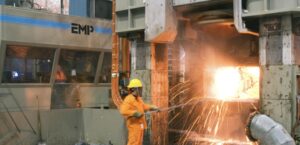7 Manufacturing Lessons From the 2024 Olympics: What Industries Can Gain from the Games

The 2024 Summer Olympics, held in Paris, have been more than just a celebration of athletic excellence; they are a showcase of innovation, precision, and global cooperation. While many of us tuned in to watch the US team push the limits of human performance, we couldn’t help but identify some parallels and lessons that can be gleaned from the Games. Here are seven key business and process takeaways that industries can adopt to improve performance, efficiency, and innovation in the years to come.
1. Precision & Attention to Detail
Olympic athletes have a track record of continuous improvement and refinement in their routine. They have a commitment to fine-tuning and optimizing their craft with a meticulous attention to detail. These athletes never accept the status quo and push to be the best. Being the best at anything requires a growth mindset and exact precision. Similarly, today’s manufacturers must also have that same mindset and attention to detail. Like an Olympian is aiming for the win, so must American manufacturers always seek new ways of keeping an edge on their competition both foreign and domestic. Every component, process, measurement, and customer interaction must be exact to ensure high quality products and results. Implementing process intelligence tools, quality control measures, and investing in industry-leading software can help manufacturers maintain this level of precision with greater ease and efficiency.
2. Leverage Advanced Technology
The 2024 Paris Olympic games have had their fair share of challenges and controversies, but something they’ve done really well is leverage the latest advancements in technology. This year’s games are a great example of how using modern tools and technology can help achieve greater planning efficiency. From sophisticated timing systems to advanced analytics, to sustainable and energy efficient equipment and electronics, everything has gone off without a hitch. Incorporating technologies like Process Automation, Artificial Intelligence (AI), Internet of Things (IoT), and even Machine Learning (ML) can streamline operations, improve speed of output, increase product quality, and boost productivity in a manufacturing shop floor or field service environment. The games showed that leaning on new technology can help support execution and innovation whether you are experienced or if you are doing something for the first time.
3. Celebrate Success and Learn from Failure
One thing we have observed and respected about watching this year’s games is the recognition and celebration of the victories but also the effort and dedication to all competitors and participants. At Decision Resources, one of our core values is a commitment to continuous learning and growth. You celebrate and embrace your wins and successes, but you learn from your failures, and you collectively grow from those as well. In manufacturing, it’s particularly important to celebrate and recognize achievements across your organization and teams (even the small victories), whether it’s meeting production goals, breaking a speed record, achieving a high safety rating, or improving an internal process. On the other hand, it’s crucial to share out learnings from any recent failures for the sake of team-wide improvements. Never throw team members under the bus for making a mistake, but rather analyze what went wrong, learn from the mistakes, and implement (and train out) corrective actions that lead to continuous improvements and prevent future issues from repeating. Embracing both your successes and setbacks fosters an environment of trust and creates a culture of excellence.
4. Innovation and Technology Integration
When it comes to the Olympics, there is an underlying drive to break records, to set new standards, and to be the best at your craft. It’s about constant improvement and a drive to win. Watching these Olympians push the boundaries of what’s possible is enough to give you chills. If 2024 has shown us anything it’s that we also have to commit to innovation and we must embrace technology to do so.
Technology is evolving at a rapid rate, and leading manufacturers who don’t prioritize these investments and modernize their operations will quickly fall behind those that do. In this year’s games, we have seen countries, teams, and the committee leverage advanced smart cameras, performance analytics tools, high-tech equipment, and smart facilities to enhance the experience while simultaneously providing new insights for competitors on how to improve and refine their routine. Things like AI, smart sensors, predictive analytics, and motion detection can help reduce waste, cut costs, and operate as lean and as efficiently as possible to maximize productivity. Just like the athletes are committed to being the best and setting new standards, together, we can respectively do the same.
5. Commit to Sustainability
One focus of the 2024 Olympic committee was sustainability. Prior to the nomination, Countries were required to submit a plan for how they intend to be sustainable, minimize their environmental impact, and reduce their carbon footprint. With over 800 scoring events, 45,000 volunteers, 15,000 athletes and millions of attendees, this is no easy feat. But Paris so far is the greenest Olympic sporting event ever hosted according to the World Economic Forum.
Similar sustainability goals and initiatives are in place for many manufacturing operations around the world with many organizations prioritizing sustainability strategies in 2024 and beyond. Adopting sustainable manufacturing practices, like using renewable energy, minimizing waste, reducing CO2 output, and implementing multi-site recycling programs are a great place to start. These initiatives not only contribute to the collective good and help improve the health of our planet, but also appeal to eco-conscious consumers, come with a heap of tax incentives, and often reduce cost of operations.
Paris did a great job of setting a gold standard when it comes to their sustainability pledge, and we can all work together to follow that lead.
6. Foster Collaboration and Teamwork
Collaboration and teamwork are the foundation of the Olympic games. It’s no secret that it’s a team effort from the athletes, coaches, staff, volunteers, and supporters all working together to achieve a collective goal. It’s easy to lose sight of the people behind the scenes in your organization that are all working together as a team to hit your goals. Having open lines of communication, monthly all-teams, collaborative chat tools like Slack or Teams, company mixers, virtual sessions, and communities and workshops for your entire company can help foster a more collaborative environment. Having the right tools in place for CRM and internal communications is also very helpful regardless of industry. It’s shown that companies who have more open lines of communication from the top down see improved problem-solving, innovation, creativity, and employee retention. Success on a manufacturing team is much like a relay race, relying on strong coordination and teamwork between each handoff.
7. Adaptability and Flexibility
Competitive athletes need to be agile by nature. Facing unexpected challenges like weather conditions, injuries, wardrobe malfunctions, venue conditions, new environments, lighting, fans, press, etc. The ability to adapt, stay focused, and remain flexible is crucial for success. Keeping your eye on the prize and maintaining your vision for the end goal is all that matters despite adversity.
In manufacturing, you face many adversities on an even larger scale. Everything from changes in regulatory requirements, customer demands, supply chain disruption, material delays, staffing shortages, and more. Implementing flexible production systems, diversifying suppliers, having a responsive approach to market changes, and having the right predictive forecasting and planning tools in place can help manufacturers adapt quickly to changes without massive disruption. Just like Olympic athletes need to stay focused, manufacturers do too. True adaptability requires having the right tools, processes, people, and software in place to achieve real measurable results regardless of what obstacles are thrown your way.
Future Forward
The 2024 Olympics are a reminder of the power of the human spirit, the value of competition, and provide a roadmap for a winning mindset applicable to any industry. Just as the US team strives for greatness as they work to bring home the gold; manufacturers can strive to meet a new gold-standard of output and performance. Together, through software, solutions, and best practices, we can raise the bar as we work towards a new era of high-performance, quality, efficiency, speed, and manufacturing excellence.
“I don’t run away from a challenge because I am afraid. Instead, I run toward it because the only way to escape fear is to trample it beneath your feet.” —Nadia Comaneci, gold-medal gymnast
If you have questions about how Decision Resources’ solutions, software, or services can help you solve your most pressing business challenges, call 412-562-9660 or email info@decision.com today. We would love to help you harness the latest advancements in technology and industry best practices to help your business WIN in today’s highly competitive environment.
Similar Blogs

January Decision Digest

December Decision Digest





